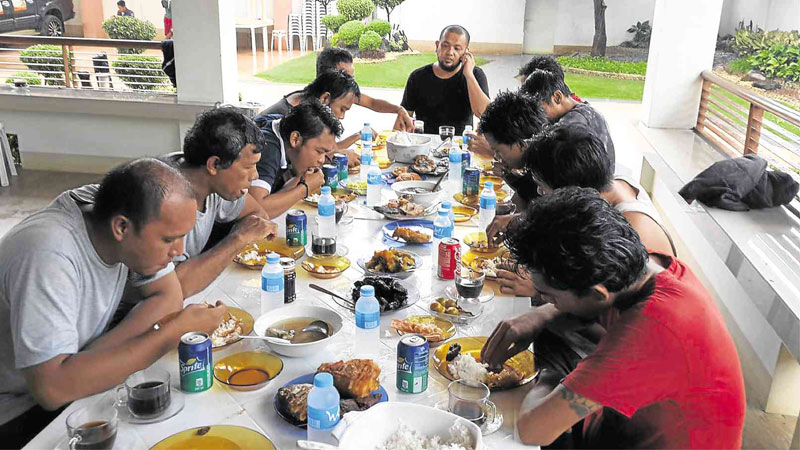
FREEDOM’S FULL MEAL Ten Indonesian sailors who were freed by the Abu Sayyaf eat a hearty meal of fried chicken, fish and rice at the house of Sulu Gov. Abdusakur Tan II in this photo he released to the Inquirer.
Youla Lasut was speechless when she found out that her husband Alfian Elvis Repi, a crew member of the tugboat Brahma 12, was eventually released by the militant Abu Sayyaf group after more than a month in captivity.
After the release of 10 captives early IN mAY, we were all relieved when Indonesian President Joko “Jokowi” Widodo announced that the other four hostages would soon join them.
READ: Abus free 10 Indonesians
The release of the Indonesian sailors teaches us important lessons in dealing with such depraved groups.
First is the virtue of “total diplomacy” as cited by Indonesian foreign minister Retno LP Marsudi, which meant concerted attempts by all stakeholders harnessing formal and informal avenues.
READ: DFA: AFP-Indon coordination led to release of 4 Abu captives
While negotiators were paramount in protecting Indonesian citizens abroad, there were other significant actors, including the military.
Second is the merit of tapping into our socio-cultural affinity with the people in the southern Philippines, who are mostly Muslim. For decades Indonesia actively supported the peace process in the conflict-torn region.
This bond with the Philippines, particularly the south, is an asset that Indonesia managed to use, apart from negotiators reportedly presenting tempeh, bakpia snacks and a copy of the Koran to the kidnappers.
Lastly the Indonesian government unequivocally denied that they succumbed to Abu Sayyaf’s demand for ransom. While defying a call for ransom has its own risks, paying it has its other drawbacks.
It might save today’s hostages, but might lead to the snatching of tomorrow’s victims. Abu Sayyaf would only become emboldened to capture more hostages if the captives become lucrative cash cows.
More rigorous preventive measures are required to avoid future kidnappings. Every year more than 100,000 ships pass through the Sulu-Sulawesi Sea, carrying 55 million metric tons of cargo and 18 million passengers.
The constructive trilateral meeting between Indonesia, Malaysia and the Philippines on May 5 demonstrated a robust political commitment among the countries to get to the bottom of the Abu Sayyaf menace.
Among other things, they agreed to conduct patrols, render immediate assistance for people and ships in distress and establish a national focal point and a hotline.
Coordinated and joint patrols among the Philippines, Indonesia and Malaysia are among the astute preventive strategies. The Malacca Strait patrols illustrate how effective and fruitful joint patrols can be.
According to the International Chamber of Commerce’s International Maritime Bureau, pirate attacks in the Malacca Straits have dropped from 38 in 2004 to just nine from 2011 to 2015.
The trilateral meeting paved the way for a more rigorous partnership in the region, especially between Indonesia and the Philippines, which finally led to the release of the four hostages.
Yet these measures are not enough. We need to not only treat the symptoms but to eliminate the virus, especially because many of the abduction cases are driven by economic motives.
The Philippines has undertaken numerous initiatives to boost development in its southern territory, but other countries, including Indonesia, also have a role to play. Indonesia and its neighbors should bolster the existing platforms to support development, particularly in underdeveloped pockets such as the Brunei Indonesia Malaysia Philippines-East Asean Growth Area (BIMP-EAGA), and also the Initiative for Asean integration.
Indonesia can attempt further connectivity between North Sulawesi and the southern Philippines such as by expediting the completion of the Davao-General Santos-Bitung shipping lane as a part of the BIMP-EAGA blueprint, which is expected to be finished this year.
Indonesia should also strengthen development and technical cooperation in the southern Philippines.
This is critical not only for economic development in the Philippines and Indonesia but also to drain any lingering sympathy for Abu Sayyaf from among the grassroots.
Indonesian development cooperation in the southern Philippines would hopefully increase affinity toward Indonesians among people in the south and hopefully contribute to resistance against future kidnapping, at least of Indonesians.
No words can explain what it feels like to not know what is happening to your loved ones when they are held hostage.
No other family should go through the agony ever again. We must take the wind out of Abu Sayyaf’s sail and to do what we need with all hands on deck.
(The writers work at the Foreign Ministry. The views expressed are their own.)